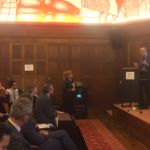Last Monday and Tuesday, 23-24 April 2018, EBC held the two-day event “Brain Research in Europe: Shaping FP9 and Delivering Innovation to the Benefit of Patients” at the University Foundation in Brussels. The event was organised in three different sessions: “FP9 and Missions”, “The Value of Innovation” and “European Brain Research: Shifting Gears and Going Global”. The full programme booklet can be found here, and below is a recap of the two fruitful days.
The event aimed to bring together leading healthcare stakeholders and policymakers to address key questions in the domain of research, such as how the upcoming 9th Framework Programme can accelerate brain research across Europe, what measures can be taken in order to stimulate the development of new central nervous system drugs for treating brain disorders, and what can be done to address the concerns of patients.
FP9 & Missions
In view of the upcoming FP9 proposal, a wide range of independent experts provided recommendations on mission oriented research and how to gain the most out of EU-funded innovation programmes. Recommendations to double the budget of the next Framework Programme have resounded across institutions: The “Lab – Fab – App” report, written under the leadership of Pascal Lamy, the European Parliament, Commission President Jean-Claude Juncker and European Commissioner for Budget Günther Oettinger. Additionally, Prof. Mariana Mazzucato provided guidance on how research and innovation can address global challenges in the recently released report “Mission-Oriented Research & Innovation in the European Union”. In light of these recommendations, the session “Missions and FP9” aims to facilitate dialogue amongst experts on the mission oriented approach of the European Commission and how the next Framework Programme can boost therapeutic innovation.
Keynote speaker Prof. Andrea Renda kicked-off the first session, giving an insightful presentation on Mission-Oriented Research and Innovation Policy in the EU. He explored EU research as it stands now, and where it could be winning and/or losing. Furthermore, he shared all the different programmes available and supportive of the brain, and called for continued collaboration.
EBC President Prof. Monica Di Luca called for the Brain to be recognised as a Mission, launching the EBC Brain Mission, which calls to ‘understand, fix and enhance’, referring to understanding the brain as the space race of the 21st century. The full Mission can be read HERE.
Newly appointed Director-General of the Directorate-General for Research and Innovation, European Commission, Jean-Eric Paquet, addressed the audience, giving insight into what’s ahead as the work to shape the next Framework Programme begins, speculating on how a mission-oriented approach could pan out.
The Value of Innovation
Developing effective treatments to improve the lives of those affected by brain disorders is extremely challenging. Despite decades of publicly and privately funded brain research, there is currently no treatment available to cure a wide range of mental and neurological conditions. What is more, research efforts do not always translate into tangible results for patients. In view of this, and in the light of the high burden that brain disorders impose on European society, the session on “The Value of Innovation” aimed to empower healthcare experts and stakeholders to present their views on issues that hinder therapeutic innovation and discuss potential solutions.
The session was introduced by EBC Treasurer Joke Jaarsma, and the morning began separated into the perspective of various stakeholders: patients, research, regulators and industry. These perspectives were shared by Hilkka Kärkkäinen (President, GAMIAN-Europe), Jacobo Santamarta Barral (Young Person’s Network at the European Multiple Sclerosis Platform), Prof. Sebastian Brandner (UCL Institute of Neurology), Dr. Marisa Papaluca (Senior Scientific Advisor, European Medicines Agency) and Dr. Christoph von der Goltz (Lundbeck).
A panel session followed, bringing in further stakeholder perspectives, with a discussion from payers, industry, researchers and policymakers. The panel was made up of Menno Aarnout (Executive Director, Association Internationale de la Mutualité), Matthias Wismar (Senior Health Policy Analyst, European Observatory on Health Systems and Policies), Nathalie Moll (Director-General, EFPIA), Prof. Colm O’Morain (Past President, Alliance for Biomedical Research in Europe) and Jaroslaw Waligora (Policy Officer, Directorate-General for Health and Food Safety, European Commission). The panel discussion was moderated by Dr Alexander Schubert (Executive Director, ECNP) and Margaret Walker (Executive Director, EUFAMI).
European Brain Research: Shifting Gears and Going Global
The third session drew focus to global initiatives and the potentials to increase collaboration at the international level, and aimed to provide an overview of the current global brain research initiatives and to allow experts to present their perspectives on how to further enhance cooperation at global level.
Many initiatives aimed at supporting brain research and improving the allocation of research funds were launched at global level in recent years. These efforts have the potential to significantly strengthen collaboration across disciplines and can therefore make a lasting difference for patients and scientists.
The session began with a welcome from Prof. Patrice Boyer, EBC Vice-President, and went on to an introduction on the global initiatives launched with the support of the European Commission by Dr Karim Berkouk, Acting Head of Unit, Non-communicable diseases and the challenge of healthy ageing, Directorate-General for Research and Innovation, European Commission.
This continued to examples of existing and potential collaboration, bringing together Dr. Ari Ercole representing the International Initiative for Traumatic Brain Injury Research (InTBIR) – concrete example of existing international collaboration and the work being done at the global level; Prof. Philippe Ryvlin, Co-Chair, Joint Task Force for Epilepsy Advocacy Europe, International League Against Epilepsy (ILAE) – exploring why epilepsy should be the next global initiative and the value of international collaboration and expanding to a more global level; and Dr. Helena Ledmyr, Head of Development & Communications, International Neuroinformatics Coordinating Facility (INCF)– introducing INCF as an organization and platform for neuroinformatics and the value of international cooperation.
Heads of global networks then gave insight into the scope and function of their organizations and how they are collaborating and cooperating both across Europe and worldwide. This included Prof. Philippe Amouyel, Chair, EU Joint Programme – Neurodegenerative Disease Research (JPND), Chris Ebell, Executive Director, Human Brain Project and Dr. Hella Lichtenberg, Senior Scientific Officer, ERA-NET Neuron.
The session was summed up and concluded by Prof. Wolfgang Oertel, EBC Vice-President, highlighting the vital need for collaboration on the brain.
We would like to thank everyone that was in attendance of the two-day event and for helping provide fruitful discussion.
Addressing the major burden on those living with brain conditions and the costs for European society requires an intensified research effort and the creation of novel solutions. The target of our proposed Brain Mission will be to decrease this enormous burden through better understanding of the physiology of the brain and disease states, relevant prevention strategies, as well as more generally, an increased awareness of the brain and its diseases.
Continued commitment to basic neuroscience research has advanced our understanding of the nervous system, with Europe successfully leading this effort designed to increase our understanding of the brain, as well as the practical and clinical application of this knowledge.
Engagement of the scientific and clinical community at all levels is required in order for the European population to benefit from discoveries and for advances in basic neuroscience to be translated into new diagnostic tools and treatments for brain disorders.
It is imperative now for the brain community to step up and call for the continued recognition of the brain and for the recognition of its importance in the upcoming Framework Programme (FP9). Help spread the Brain Mission far and wide and let’s continue to commit ourselves to advocating for the brain and for the 179 million people across Europe living with brain disorders.
See: BRAIN MISSION





